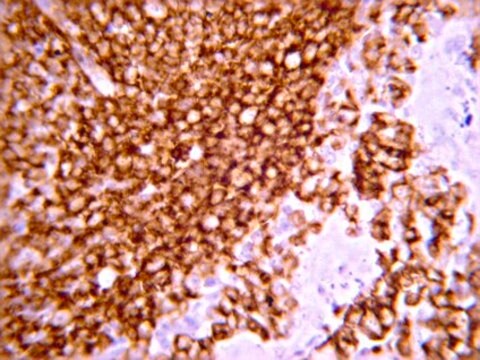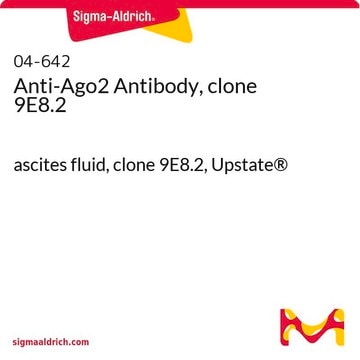SAB4200724
Anti-AGO2 antibody, Mouse monoclonal
clone AGO2-10, purified from hybridoma cell culture
Sinónimos:
Anti-Argonaute RISC catalytic component 2, Anti-Argonaute2, Anti-Eukaryotic translation initiation factor 2C 2, Anti-PAZ Piwi domain protein (PPD), Anti-Protein Argonaute 2, Anti-eIF2C 2
About This Item
Productos recomendados
biological source
mouse
Quality Level
antibody form
purified from hybridoma cell culture
antibody product type
primary antibodies
clone
AGO2-10, monoclonal
form
buffered aqueous solution
mol wt
~95 kDa
species reactivity
human
concentration
~1.0 mg/mL
technique(s)
immunoblotting: 2-4 μg/mL using extract of HEK-293T cells transfected with human AGO2
immunoprecipitation (IP): 10-20 μg/test using HeLa cells extract
isotype
IgG1
UniProt accession no.
shipped in
dry ice
storage temp.
−20°C
target post-translational modification
unmodified
Gene Information
human ... AGO2(27161)
General description
Immunogen
Application
Biochem/physiol Actions
Physical form
Disclaimer
¿No encuentra el producto adecuado?
Pruebe nuestro Herramienta de selección de productos.
Storage Class
10 - Combustible liquids
wgk_germany
WGK 1
flash_point_f
Not applicable
flash_point_c
Not applicable
Certificados de análisis (COA)
Busque Certificados de análisis (COA) introduciendo el número de lote del producto. Los números de lote se encuentran en la etiqueta del producto después de las palabras «Lot» o «Batch»
¿Ya tiene este producto?
Encuentre la documentación para los productos que ha comprado recientemente en la Biblioteca de documentos.
Nuestro equipo de científicos tiene experiencia en todas las áreas de investigación: Ciencias de la vida, Ciencia de los materiales, Síntesis química, Cromatografía, Analítica y muchas otras.
Póngase en contacto con el Servicio técnico








